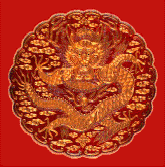Joseon (July 1392 - August 1910) was a sovereign state founded by Taejo Yi Seong-gye in what is modern day Korea and lasted for approximately five centuries as one of the world's longest running monarchies. It was founded in the aftermath of the overthrow of the Goryeo Kingdom which today is the city of Kaesong. |
Early on, Korea was retitled and the capital was relocated to modern-day Seoul and the kingdom's northernmost borders were expanded to the natural boundaries at the Yalu and Tumen rivers (through the subjugation of the Jurchens). Joseon was the last royal and later imperial dynasty of Korean antiquity and one of the longest lasting royal states in world history and it was the longest ruling Confucian dynasty. After declaring the Korean Empire in 1897, the dynasty ended with Japanese annexation in 1910. |
 Royal seal of Joseon |
An accomplished military strategist and renowned commander who originally distinguished himself by repelling Wokou who were marauding the peninsula, Yi Seong-gye or King Taejo, of the Jeonju clan of Yi, got power in a cope against King U of the Goryeo Dynasty and overthrew and two years later poisoned, King Gongyang of Goryeo subsequently ascended the throne. |
The capital was relocated to Hanseong (modern-day Seoul) from Gaegyeong (modern-day Gaeseong) in 1394 and the Gyeongbokgung palace was erected. From King Taejo descended an unbroken patrilineal succession of kings, a line of descent that continues to the modern era. The last ruling monarch was Sunjong, the Yungheui Emperor,who was demoted from his status as head of state in 1910 and surviving bloodlines of the Joseon Dynasty today primarily consist of the descendants of Yeongchinwang (Crown Prince Uimin) and Uichinwang (Prince Uihwa), Sunjong's younger brothers. |
During its reign, Joseon consolidated its absolute rule over Korea, encouraged the entrenchment of Confucian ideals and doctrines in Korean society, imported and adopted Chinese culture and saw the height of classical Korean culture, trade, science, literature, and technology. However, the dynasty was severely weakened during the late 16th and early 17th centuries, when successive invasions by neighboring Japan and Qing China virtually overran the peninsula, leading to a harsh isolationist policy for which the country became known as the Hermit Kingdom. |
Whatever power the kingdom recovered during its isolation further waned as the 18th century came close and faced with internal strife, power struggles, international pressure and rebellions at home, the Joseon Dynasty declined rapidly in the late 19th century. |
In 1895, The Joseon Dynasty was forced to write a document of independency from the Qing Dynasty after the Japanese victory in the First Sino-Japanese War and its peace treaty, the Treaty of Shimonoseki. From 1897 to 1910, the Korea was formally known as the Korean Empire to signify a sovereign nation no longer a tributary of the Qing Dynasty. The Joseon Dynasty came to an end in 1910, when the Japan-Korea Annexation Treaty was enforced by the Empire of Japan. |
The Joseon's rule has left a substantial legacy on the modern face of Korea; much of modern Korean etiquette, cultural norms, societal attitudes towards current issues and even the modern Korean language and its dialects stem from the traditional thought pattern that originated from this period. |
 Taegukgi (Flag of South Korea) after 1883 |
Today, Joseon was often called as "Yi dynasty" but it is referred to as "Joseon Dynasty" more often recently in Japan. |
|

